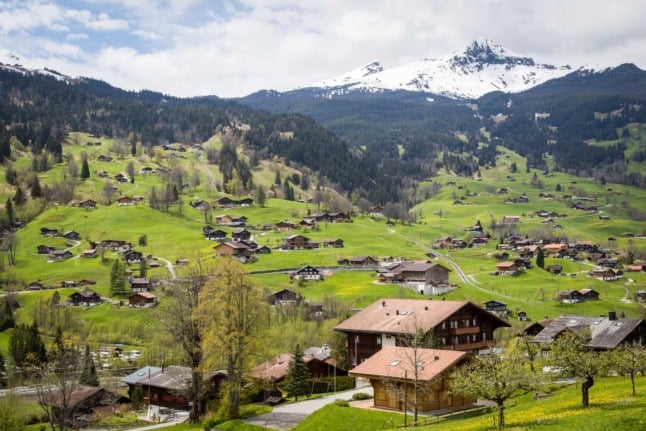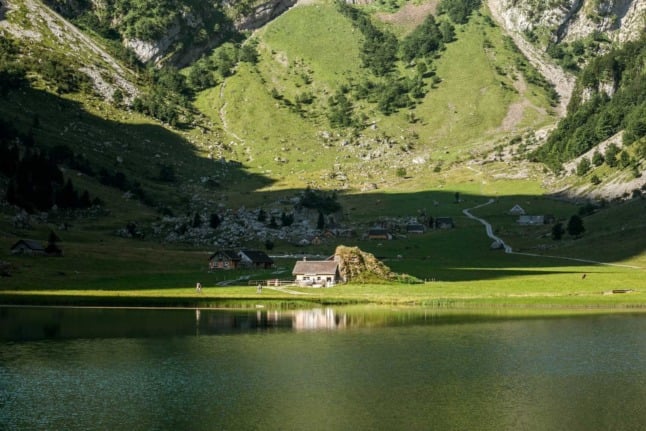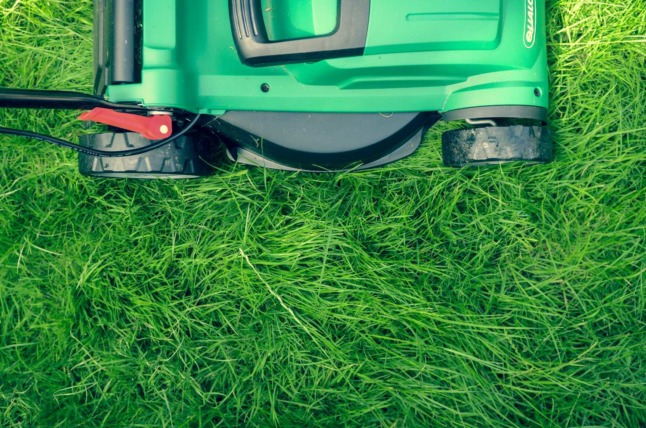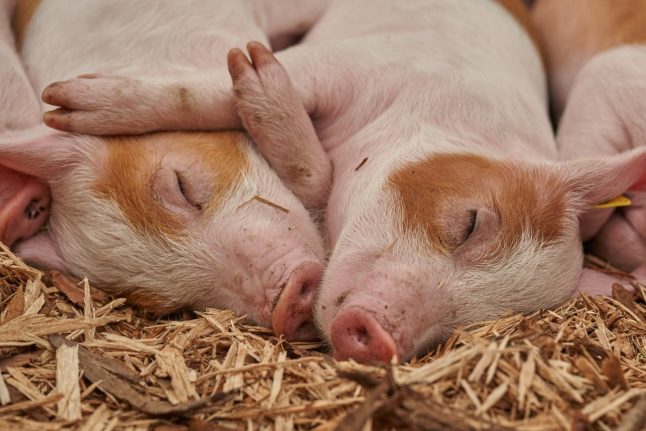For those of us lucky enough to live in Switzerland with a backyard, we are not given complete control.
The same goes for people living in apartments with shared yards, squares or courtyards, who will need to abide by certain rules.
The rules relate to what you are allowed to do, what you can build and even the maintenance you can engage in.
But while you’re free to plant (almost) anything you like and enjoy your garden, there are some rules on what you can and cannot do in Switzerland.
Here’s a summary of the major rules and restrictions for those owning a garden or sharing a courtyard in Switzerland.
Using the common area
As a way of accounting for the lack of space in Switzerland – particularly in urban areas – many Swiss apartment complexes are built with shared space.
This can be courtyards and in some cases can include grassed areas.
Generally speaking, the use of these areas will be regulated by your tenancy or purchase agreement, however you will be able to use the common area for most activities.
This includes having a barbecue or doing yoga.
The main question will be whether you are seen to be claiming part of the area for yourself, which you are not allowed to do.
This can be complicated for instance when people want to grow vegetables, which could be seen to be taking up the common space.
In each example, it’s best to talk to your landlord or your neighbours about what is acceptable – and offer them some vegetables, of course.
READ MORE: Can I have a barbecue on my balcony in Switzerland?
Cameras on your own property
With cameras becoming cheaper, it is easier than ever to set up home security systems based around CCTV cameras.
However unlike the US or the UK where these are common place, privacy is still a focus in Switzerland and there will be resistance if you set up a camera which can film your neighbour or part of their property.
You are not allowed to set up a camera which films your neighbour or your neighbours’ property.
You can film your own, but signs need to be placed in and around the property advising that the area is being filmed.

Using a hose
While you are allowed to water your plants, there are some restrictions on hose use in Switzerland.
Using a hose to clean your car is largely forbidden due to concerns you will pollute the local waterways.
As a result, anyone wanting to wash their car must either hope for rain or visit a professional car wash, notes Swiss news outlet SRF.
While using a hose to clean your driveway might annoy some eco-conscious Swiss who’ll tell you to use a broom, this is not forbidden unless there’s a serious drought.
Mowing the lawn
If you’re new to Switzerland, it may surprise you to see that mowing your lawn is only allowed at certain times.
Problematically for people who work Monday to Friday, mowing the lawn is often restricted on Sundays – and sometimes it is outright banned.
READ MORE: The ten strange laws in Switzerland you need to know
As with all rules and bylaws, it’s best to comply rather than break them and ask for forgiveness later, although if it doesn’t annoy your neighbours you should be able to get away with it.
Trim your trees
Alright so you’ve mowed the lawn (on an appropriate day) but now you notice that some of your trees, bushes and shrubs are getting a little out of hand.
In Switzerland, not all trees on your property can be trimmed or removed at your discretion.
The Tree Protection Ordinances in place in Swiss municipalities differ widely and will protect certain foliage.
The main questions here relate to the diameter of the tree, where it is located and how high it is.
The time of year will also be relevant, with relatively tight restrictions on felling trees during birds’ nesting and breeding seasons from March until the end of September.
Killing weeds
Fortunately for fans of a tidy garden (and despite what your husband or wife might tell you on gardening day), there are no restrictions on pulling out weeds. In Switzerland, you can weed ’til your heart’s content.
However, if you decide to use poisons, be careful to make sure they are permitted for use in Switzerland – or you might get a hefty fine.
Switzerland’s Chemical Risk Ordinance – which can vary in different cantons and municipalities – restricts certain herbicides due to concerns surrounding groundwater.
Using certain poisons can attract a fine of up to CHF3,000 under the ordinance, while you may also risk an additional CHF600 fine under the Environmental Protection Act for your troubles.
It’s always best to double check the rules with cantonal or municipal authorities, or with the attendant at your hardware store when you are buying the weed killer.
Messing with neighbours plants
Obviously climbing the fence and chopping down your neighbours trees isn’t allowed, but Swiss law does allow you to trim branches from your neighbours plants when they stray into your yard.
As with everything, use your common sense and talk to your neighbours first. Simply trimming a branch that is hanging over your fence will not win you many friends.
READ MORE: Eight ways you might be annoying your neighbours (and not realising it) in Switzerland
If there is a branch in your yard, simply mention it is annoying you and ask if you can trim it.
If a fruit tree crosses into your yard, you are also entitled by Swiss law to pick the fruit (and presumably eat it), although the same common sense principles outlined above should apply.
Things get a little more difficult if the tree does not stray into your yard but it still impacts the enjoyment of your property.
This could be for instance if it blocks out light or a view, or if it has gotten a little too large and you are worried it could fall and do damage to your property.
As with the above, speak to your neighbour and try to find a compromise first.
If not, disputes of this nature are handled by the responsible council or municipal authority in your canton.
Swiss news outlet 20 Minutes reports that compromises tend to be handed down by council authorities which satisfy both parties, for instance by ordering that the tree is trimmed rather than fell.
You are also allowed to stop your neighbour from using too much pesticide or weed killers if you fear it might interfere with your own garden.

Laundry on a Sunday
Most of the restrictions in this article are centred around activities that annoy your neighbours, mess with their property or pollute the environment.
But one on the list doesn’t do any of the three – but is still banned.
In many cases, you will be prevented from hanging out your laundry on a Sunday in Switzerland.
Hanging out your laundry on a Sunday is banned in Switzerland because it doesn’t look neat and tidy, which seems rather arbitrary but it remains an important regulation for prying neighbours everywhere.
| Banner ad |
Having a fire
If you’re living in one of the few Swiss houses to have a fireplace, then you are presumably allowed to use it, unless tenancy regulations prevent it at certain times.
You are also usually allowed to have a barbecue or grill either on your balcony or in your backyard, provided the noise and smoke is not excessive.
READ MORE: Can I have a barbecue on my balcony in Switzerland?
Whether or not you are allowed to have a fire in your backyard however will depend on the rules in your canton.
You are generally prohibited from burning any waste in Switzerland, other than typical forest or garden waste (i.e. wood, grass, twigs, sticks and leaves).
That however can also be restricted at certain times of the year.
In Zurich, for instance, fires in backyards are only permitted from March to October, meaning that you will need to find other ways to stay warm in the winter months in Switzerland’s most populous canton.
Building anything and everything on your property
While putting up a shed in a shared lawn or courtyard will not be allowed as this is clearly claiming the area for yourself, you are also restricted somewhat on your own lawn.
Swiss rules are relatively strict for building anything which could be deemed to be a ‘construction’ on your own property, even if it could be taken down.
Dog houses and blow up pools will not be a problem in your own backyard, but larger, fancier dog houses and permanent above ground pools will need permission from the municipality.
In almost all cases, it’s best to speak with the municipality about the rules.
Things like blow up pools and dog houses should be ok in shared facilities. It’s best however to speak to your building owner, tenants collective or body corporate for anything in a shared space in your apartment.
Make your neighbour put a fence around your pond
For a country which prides itself on individual rights, it might surprise you that you can make your neighbour put a fence or other obstruction around their pond on their own property in some cases.
If you have children, you can ask that your neighbour secure their pond, pool or waterway from your kids – and you’ll have the law on your side if there is a dispute.
| Banner ad |
Noise
Noise rules for backyards are the same as those which apply for any form of residential dwelling.
Basically you are allowed to do what you like, as long as it is not excessive.
The rules relating to excessive noise are judged according to the ‘reasonable’ person standard, meaning that if a reasonable person would consider them to be excessive, then they are.
What is reasonable will be different before and after 10pm at night too (and until 7am).
Generally speaking, this is regulated according to the ‘tree falling in the woods’ principle, i.e. if nobody hears it (or is bothered by it), then it didn’t really happen.
In each case, it’s best to chat to your neighbours and explain the situation to them, i.e. that you will be having a party, band practice or a yodelling session with a few close friends, and they are less likely to be surprised by it.



 Please whitelist us to continue reading.
Please whitelist us to continue reading.
Member comments